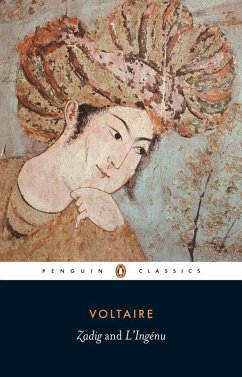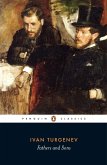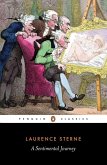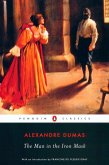20,99 €
inkl. MwSt.
Versandfertig in 2-4 Wochen

10 °P sammeln
- Broschiertes Buch
- Merkliste
- Auf die Merkliste
- Bewerten Bewerten
- Teilen
- Produkt teilen
- Produkterinnerung
- Produkterinnerung
One of Voltaire's earliest tales, Zadig is set in the exotic East and is told in the comic spirit of Candide; L'Ingenu, written after Candide, is a darker tale in which an American Indian records his impressions of France
Andere Kunden interessierten sich auch für
![Mephisto Mephisto]() Klaus MannMephisto17,99 €
Klaus MannMephisto17,99 €![Fathers and Sons Fathers and Sons]() Ivan TurgenevFathers and Sons17,99 €
Ivan TurgenevFathers and Sons17,99 €![Bel-Ami Bel-Ami]() Guy MaupassantBel-Ami17,99 €
Guy MaupassantBel-Ami17,99 €![Bartleby the Scrivener Bartleby the Scrivener]() Herman MelvilleBartleby the Scrivener7,99 €
Herman MelvilleBartleby the Scrivener7,99 €![A Sentimental Journey Through France and Italy by Mr. Yorick A Sentimental Journey Through France and Italy by Mr. Yorick]() Laurence SterneA Sentimental Journey Through France and Italy by Mr. Yorick9,99 €
Laurence SterneA Sentimental Journey Through France and Italy by Mr. Yorick9,99 €![The Man in the Iron Mask The Man in the Iron Mask]() Alexandre DumasThe Man in the Iron Mask16,99 €
Alexandre DumasThe Man in the Iron Mask16,99 €![Notes from Underground and the Double Notes from Underground and the Double]() Fyodor DostoyevskyNotes from Underground and the Double17,99 €
Fyodor DostoyevskyNotes from Underground and the Double17,99 €-
-
One of Voltaire's earliest tales, Zadig is set in the exotic East and is told in the comic spirit of Candide; L'Ingenu, written after Candide, is a darker tale in which an American Indian records his impressions of France
Hinweis: Dieser Artikel kann nur an eine deutsche Lieferadresse ausgeliefert werden.
Hinweis: Dieser Artikel kann nur an eine deutsche Lieferadresse ausgeliefert werden.
Produktdetails
- Produktdetails
- Verlag: Penguin Books Ltd
- Seitenzahl: 192
- Erscheinungstermin: 30. November 1978
- Englisch
- Abmessung: 197mm x 128mm x 13mm
- Gewicht: 148g
- ISBN-13: 9780140441260
- ISBN-10: 0140441263
- Artikelnr.: 21984446
- Herstellerkennzeichnung
- Libri GmbH
- Europaallee 1
- 36244 Bad Hersfeld
- gpsr@libri.de
- Verlag: Penguin Books Ltd
- Seitenzahl: 192
- Erscheinungstermin: 30. November 1978
- Englisch
- Abmessung: 197mm x 128mm x 13mm
- Gewicht: 148g
- ISBN-13: 9780140441260
- ISBN-10: 0140441263
- Artikelnr.: 21984446
- Herstellerkennzeichnung
- Libri GmbH
- Europaallee 1
- 36244 Bad Hersfeld
- gpsr@libri.de
François-Marie Arouet, writing under the pseudonym Voltaire, was born in 1694 into a Parisian bourgeois family. Educated by Jesuits, he was an excellent pupil but one quickly enraged by dogma. An early rift with his father--who wished him to study law--led to his choice of letters as a career. Insinuating himself into court circles, he became notorious for lampoons on leading notables and was twice imprisoned in the Bastille. By his mid-thirties his literary activities precipitated a four-year exile in England where he won the praise of Swift and Pope for his political tracts. His publication, three years later in France, of Lettres philosophiques sur les Anglais (1733)--an attack on French Church and State--forced him to flee again. For twenty years Voltaire lived chiefly away from Paris. In this, his most prolific period, he wrote such satirical tales as "Zadig" (1747) and "Candide" (1759). His old age at Ferney, outside Geneva, was made bright by his adopted daughter, "Belle et Bonne," and marked by his intercessions in behalf of victims of political injustice. Sharp-witted and lean in his white wig, impatient with all appropriate rituals, he died in Paris in 1778--the foremost French author of his day.
Zadig/L'IngénuIntroduction
Biographical Note
Zadig
Imprimatur
Epistle Dedicatory from Sadi to the Sultana Sheraa
1. Blind in One Eye
2. The Nose
3. The Dog and the Horse
4. Green Eyes
5. The Contest in Generosity
6. The Minister
7. Disputes and Audiences
8. Jealousy
9. The Beaten Woman
10. Slavery
11. The Funeral Pyre
12. The Supper Party
13. The Assignations
14. The Brigand
15. The Fisherman
16. The Cockatrice
17. The Tournament
18. The Hermit
19. The Riddles
L'Engénu
(The Child of Nature)
1. How the Prior of Our Lady of the Mountain and his sister met a Huron
Indian
2. The Child of Nature is recognized by his relatives
3. The conversion of the Child of Nature
4. The Child of Nature baptized
5. The Child of Nature in love
6. The Child of Nature rushes to his mistress and becomes enraged.
7. The Child of Nature repels the English
8. The Child of Nature goes to Court and on the way has supper with some
Huguenots
9. The arrival of the Child of Nature at Versailles, and his reception at
Court
10. The Child of Nature imprisoned in the Bastille with a Jansenist
11. The Child of Nature develops his talents
12. The Child of Nature's opinions on plays
13. The lovely St Yves goes to Versailles
14. The Child of Nature's intellectual progress
15. The lovely St Yves resists certain delicate propositions
16. She consults a Jesuit
17. Her virtue her downfall
18. She delivers her lover and a Jansenist
19. The Child of Nature, the lovely St Yves, and their relatives are
reunited
20. The death of the lovely St Yves, and its consequences
Biographical Note
Zadig
Imprimatur
Epistle Dedicatory from Sadi to the Sultana Sheraa
1. Blind in One Eye
2. The Nose
3. The Dog and the Horse
4. Green Eyes
5. The Contest in Generosity
6. The Minister
7. Disputes and Audiences
8. Jealousy
9. The Beaten Woman
10. Slavery
11. The Funeral Pyre
12. The Supper Party
13. The Assignations
14. The Brigand
15. The Fisherman
16. The Cockatrice
17. The Tournament
18. The Hermit
19. The Riddles
L'Engénu
(The Child of Nature)
1. How the Prior of Our Lady of the Mountain and his sister met a Huron
Indian
2. The Child of Nature is recognized by his relatives
3. The conversion of the Child of Nature
4. The Child of Nature baptized
5. The Child of Nature in love
6. The Child of Nature rushes to his mistress and becomes enraged.
7. The Child of Nature repels the English
8. The Child of Nature goes to Court and on the way has supper with some
Huguenots
9. The arrival of the Child of Nature at Versailles, and his reception at
Court
10. The Child of Nature imprisoned in the Bastille with a Jansenist
11. The Child of Nature develops his talents
12. The Child of Nature's opinions on plays
13. The lovely St Yves goes to Versailles
14. The Child of Nature's intellectual progress
15. The lovely St Yves resists certain delicate propositions
16. She consults a Jesuit
17. Her virtue her downfall
18. She delivers her lover and a Jansenist
19. The Child of Nature, the lovely St Yves, and their relatives are
reunited
20. The death of the lovely St Yves, and its consequences
Zadig/L'IngénuIntroduction
Biographical Note
Zadig
Imprimatur
Epistle Dedicatory from Sadi to the Sultana Sheraa
1. Blind in One Eye
2. The Nose
3. The Dog and the Horse
4. Green Eyes
5. The Contest in Generosity
6. The Minister
7. Disputes and Audiences
8. Jealousy
9. The Beaten Woman
10. Slavery
11. The Funeral Pyre
12. The Supper Party
13. The Assignations
14. The Brigand
15. The Fisherman
16. The Cockatrice
17. The Tournament
18. The Hermit
19. The Riddles
L'Engénu
(The Child of Nature)
1. How the Prior of Our Lady of the Mountain and his sister met a Huron
Indian
2. The Child of Nature is recognized by his relatives
3. The conversion of the Child of Nature
4. The Child of Nature baptized
5. The Child of Nature in love
6. The Child of Nature rushes to his mistress and becomes enraged.
7. The Child of Nature repels the English
8. The Child of Nature goes to Court and on the way has supper with some
Huguenots
9. The arrival of the Child of Nature at Versailles, and his reception at
Court
10. The Child of Nature imprisoned in the Bastille with a Jansenist
11. The Child of Nature develops his talents
12. The Child of Nature's opinions on plays
13. The lovely St Yves goes to Versailles
14. The Child of Nature's intellectual progress
15. The lovely St Yves resists certain delicate propositions
16. She consults a Jesuit
17. Her virtue her downfall
18. She delivers her lover and a Jansenist
19. The Child of Nature, the lovely St Yves, and their relatives are
reunited
20. The death of the lovely St Yves, and its consequences
Biographical Note
Zadig
Imprimatur
Epistle Dedicatory from Sadi to the Sultana Sheraa
1. Blind in One Eye
2. The Nose
3. The Dog and the Horse
4. Green Eyes
5. The Contest in Generosity
6. The Minister
7. Disputes and Audiences
8. Jealousy
9. The Beaten Woman
10. Slavery
11. The Funeral Pyre
12. The Supper Party
13. The Assignations
14. The Brigand
15. The Fisherman
16. The Cockatrice
17. The Tournament
18. The Hermit
19. The Riddles
L'Engénu
(The Child of Nature)
1. How the Prior of Our Lady of the Mountain and his sister met a Huron
Indian
2. The Child of Nature is recognized by his relatives
3. The conversion of the Child of Nature
4. The Child of Nature baptized
5. The Child of Nature in love
6. The Child of Nature rushes to his mistress and becomes enraged.
7. The Child of Nature repels the English
8. The Child of Nature goes to Court and on the way has supper with some
Huguenots
9. The arrival of the Child of Nature at Versailles, and his reception at
Court
10. The Child of Nature imprisoned in the Bastille with a Jansenist
11. The Child of Nature develops his talents
12. The Child of Nature's opinions on plays
13. The lovely St Yves goes to Versailles
14. The Child of Nature's intellectual progress
15. The lovely St Yves resists certain delicate propositions
16. She consults a Jesuit
17. Her virtue her downfall
18. She delivers her lover and a Jansenist
19. The Child of Nature, the lovely St Yves, and their relatives are
reunited
20. The death of the lovely St Yves, and its consequences







